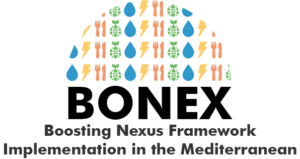 La región mediterránea se enfrenta a desafíos cada vez mayores para garantizar el suministro de agua y alimentos, ya que los países experimentan un aumento de la demanda y una disminución de la disponibilidad de recursos naturales. El enfoque del nexo pretende gestionar y aprovechar las sinergias entre sectores mediante una gestión eficiente e integrada del nexo entre agua, energía, alimentos y ecosistemas (WEFE).
La región mediterránea se enfrenta a desafíos cada vez mayores para garantizar el suministro de agua y alimentos, ya que los países experimentan un aumento de la demanda y una disminución de la disponibilidad de recursos naturales. El enfoque del nexo pretende gestionar y aprovechar las sinergias entre sectores mediante una gestión eficiente e integrada del nexo entre agua, energía, alimentos y ecosistemas (WEFE).
Los objetivos de BONEX son proporcionar herramientas prácticas y adaptadas, examinar innovaciones tecnológicas concretas y adaptadas al contexto, mejorar las políticas y la gobernanza y facilitar una aplicación práctica del nexo WEFE que equilibre las compensaciones sociales, económicas y ecológicas.
El objetivo del proyecto es elaborar un novedoso marco transdisciplinar de diagnóstico del nexo WEFE, que combine métodos adaptados al contexto y vaya más allá de los enfoques disciplinarios tradicionales. Las herramientas de diagnóstico que respaldan el marco se desarrollarán y probarán en siete proyectos de demostración seleccionados en la región, que pilotarán tecnologías innovadoras (agrivoltaicos, sistemas de reutilización de aguas residuales, etc.).
Como resultado, BONEX proporcionará a los responsables políticos y a los profesionales una herramienta interactiva de apoyo a la toma de decisiones para evaluar las compensaciones, las sinergias y los enfoques de soluciones del nexo de forma transdisciplinaria. Además, generará experiencias valiosas sobre la adaptación de tecnologías innovadoras del nexo WEFE que proporcionarán nuevas oportunidades de negocio. El enfoque del nexo WEFE es fundamental para implementar sistemas agroalimentarios sostenibles y preservar los ecosistemas.
Dentro de BONEX, FutureWater contribuirá activamente al paquete de herramientas de diagnóstico. Se utilizará una herramienta sencilla de contabilización del agua (REWAS) para evaluar si se logra un «ahorro real de agua» con las tecnologías innovadoras. La herramienta de contabilización del agua evalúa los flujos de agua a nivel de campo y a escala de distrito de riego, y determina si se alcanza un «ahorro real». La herramienta también incorporará aspectos relacionados con la producción de alimentos (rendimiento de los cultivos) y añadirá componentes para evaluar aspectos relacionados con la energía y la calidad del agua, complementando así los aspectos del nexo WEFE. Los siete proyectos de demostración se utilizarán para demostrar y desarrollar esta herramienta de forma iterativa. Se realizará un análisis hidrológico en ubicaciones seleccionadas para evaluar también el impacto a escala de cuenca hidrográfica. Finalmente, los resultados de estos análisis se traducirán en implicaciones políticas y en logros relacionados con los Objetivos de Desarrollo Sostenible (ODS).
Este proyecto forma parte del programa PRIMA, apoyado por la Unión Europea.
![]()
